
FLORENCE BALLARD,
THE FIRST SUPREME
By Alan White
| Although her story has never been written, enough information has been printed about Florence Ballard over the years to give the public more than a casual knowledge of her life. |
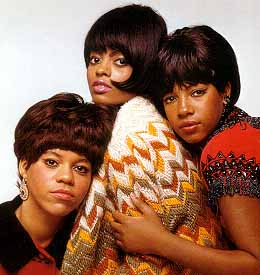
|
Born in Detroit on 30 June 1943, Florence was the eighth of Jesse and Lurlee Ballard's thirteen children. Almost from the start, music played an important part in her life. Her father was her first teacher. Even though he spent most of his time working in the automobile factory to support his family, Jesse Ballard was never too tired to pursue his hobby of playing the guitar and singing. Florence showed a strong interest in his music. In turn, he would play special songs and teach her to sing them. These early lessons made a deep impression. Soon she was outsinging her father. Her talent quickly earned her a reputation in the neighborhood. |
|
In the Brewster Housing Project where the Ballards lived, Florence delighted the neighbors with her clear, powerful voice as she casually sang the hits played on the radio. Her musical gift was hard to go unnoticed. As she grew older she found an outlet for her singing in school music classes and choirs. While in her early teens, Florence's career was set in motion. Two of her neighbors, Eddie Kendricks and Paul Williams, sang in an upcoming group called the Primes (later to become the Temptations). They brought her to the,attention of their manager, Milton Jenkins, who was so impressed with the 14-year-old's voice that he asked her to perform as a soloist along with the Primes. After Florence appeared with this group in a few engagements, Jenkins knew he had found an outstanding talent. |
|
| Since groups were so popular in the late fifties, he suggested that Florence form a sister group to the Primes with himself as their manager. Florence liked the idea and immediately asked her friend, Mary Wilson, to be a member of the group. Betty McGlown and Mary's friend, Diana Ross, were also recruited. After gaining their parent's permission, the four teenagers, in the spring of 1959, became officially known as the Primettes. They began rehearsals with Florence as the lead singer. |
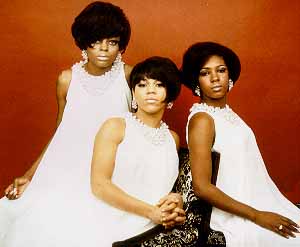
|
|
The girls had their work cut out for them and approached it with zeal. They spent as much time as possible after school and on weekends learning songs, rehearsing harmonies, and perfecting their look. Jenkins found the girls so well-rehearsed that he made a special effort to promote them. As a result, the Primettes were performing at record hops, talent shows, and special engagements. As polished an act as they were, however, the Primettes frequently performed without pay. But on the positive side, they gained valuable experience and a local following.
Life was not without its difficulties during these early stages of Florence's group. Sometimes, just getting everyone together at the same time for rehearsals presented a major challenge. If a group member was needed at home for chores, or if a girl's parents felt she was spending more time at singing than on her schoolwork, her attendance at rehearsals would be limited or halted until the obligation was satisfied. Then there was the problem of finding a replacement for Betty McGlown, who left the group. Fortunately, Barbara Martin was quickly brought in to fill the gap. Soon the Primettes were looking for a record company. Diana Ross contacted her former neighbor, Smokey Robinson, who was singing with the Miracles.
In 1961, Gordy signed the Primettes to a contract with Motown. Shortly after their first single, "I Want A Guy," was released, Barbara Martin dropped out of the group. Gordy decided to let the group remain a trio. Although everyone knew that Florence had the stronger, more developed voice, Gordy decided to make Diana the lead singer because she had a sound he believed would "cross over" and appeal to white audiences. While Diana was the official lead singer, she, Florence, and Mary still shared leads on recordings as well as in live performances. For example, their second record, "Who's Lovin' You," featured Diana as the lead singer but it was the flip side, "Buttered Popcorn," with Florence on lead, that got all the attention. As several writers noted, this song could have been a hit but for some curious reason was not promoted by Motown.
Several changes in the group altered the course of popular music. Shortly after Barbara's departure, the Primettes were renamed the Supremes. Florence chose the name from a list of possibilities
The group's chemistry was the product of years of personal involvement. Florence, Diana, and Mary were close friends who lived out their girlhoods together and loved each other as sisters. They shared the same vision, spent years perfecting and bringing it to reality, and loved what they were doing. This emotional involvement and unity of purpose is what made the three click as a group. It generated the electricity and perfect harmony which radiated throughout their performances. If chemistry was one ingredient of the Supremes' success, their image was another. Their image was shaped out of contradictions. Here were three young black women straight out of Detroit's Brewster Housing Projects, who had grown up in low-income surroundings-is. But there was something about their svelte figures, tasteful wardrobe, and the graceful manner in which they moved and spoke, that denied their background and suggested the finest upbringing.
|
|
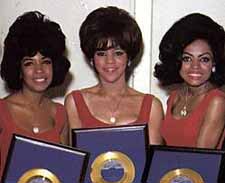 |
Then there was the music. The Supremes took rhythm and blues, which, in the sixties was an exclusively black form of music, and stylized it with a pop flair. The result was a new sound that appealed to a broad audience, crossing social, age, racial, and cultural categories. And this flew sound helped make the Supremes international stars. |
|
Playing the definitive role in the group's success were the young women themselves. Each contributed something unique to the group. Diana's enthusiasm and Mary's charm blended with Florence's quiet dignity to give the Supremes their mystique.
Florence also stood out in a different way. She had a wonderful sense of humor that never failed to touch those around her. Perhaps it was for this reason that the Supremes' writers would create funny lines for her in the group's stage act. During live performances, she always managed to interject a comment at just the right moment which never failed to bring the house clown with laughter. As the Supremes reached the peak of popularity in 1967, Florence left the group. She was replaced by Cindy Birdsong. The group was renamed Diana Ross and the Supremes. The official explanation for Florence's departure was that she wanted to spend more time with her family. Later on, the cause of her leaving would become the subject of much rumor and controversy. After a brief rest, Florence started a new phase of her life. She married Thomas Chapman in February 1968. A month later she signed a two-year contract with ABC Records. George Kerr, a former Motown producer, produced her first single, "It Doesn't Matter How I Say It." This happy-go-lucky tune was cute, had a teenage innocence and a catchy beat. But despite these features, the song went nowhere on the sales charts due to poor distribution and promotion. Meanwhile, Florence put the finishing touches on her debut album. Titled "You Don't Have To," the album was never released. Instead, another single, "Love Ain't Love," was released in the fall of 1968. Produced by Bob Bateman, also from Motown, the record made a showing on the local charts in Detroit. But like the first single, "Love Ain't Love" failed to garner any success. It, too, was inadequately distributed and promoted. Despite the problem with her records, Florence made personal appearances and was well received by the public. She performed in Atlantic City, appeared on several television shows on the east coast, and was the opening act for Wilson Pickett. In October 1968, she rode in a Chicago parade with comedian Godfrey Cambridge. After the birth of her twins, Michelle and Nicole, she continued to work, performing with Bill Cosby at the Auditorium Theatre in Chicago and at President Richard Nixon's inauguration party.
By late spring 1975, she was ready to renew her career. She sang to a full house at Detroit's Ford Auditorium on 25 June 1975, receiving standing ovations. Her lawsuit against her former attorney was settled and she received a large cash settlement. She reconciled with her husband, bought a new house, and made several television appearances. Her life was busier and happier than it had been in several years. She was back on top. However, her health took a turn for the worse. She was stricken with a sudden illness and had to be rushed to the hospital. A day later, on 22 February 1976, she quietly passed away at the age of 31. Though she departed this life before she could renew her career, Florence continues to live through the wonderful legacy of the Supremes. |
|
ORDER FORM HOME PAGE
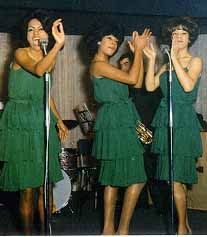 Through him she arranged for the Primettes to audition with Berry Gordy of Motown Records. After listening to the eager teenagers, Gordy told them to come back after they had graduated from high school. The girls did not let this brush-off take away their enthusiasm. They were so intrigued by Motown and its artists that they visited the studio whenever possible, becoming almost permanent fixtures there. Finally, they were allowed to perform simple background parts on recordings such as hand claps.
While busy opening doors for themselves at Motown, the Primettes also kept an eye out for any record company willing to sign them. Luck soon struck - or so they thought - when they landed a contract with a small label, Lupine Records. On this label, they released "Tears of Sorrow" and "Pretty Baby." Both were flops.
Through him she arranged for the Primettes to audition with Berry Gordy of Motown Records. After listening to the eager teenagers, Gordy told them to come back after they had graduated from high school. The girls did not let this brush-off take away their enthusiasm. They were so intrigued by Motown and its artists that they visited the studio whenever possible, becoming almost permanent fixtures there. Finally, they were allowed to perform simple background parts on recordings such as hand claps.
While busy opening doors for themselves at Motown, the Primettes also kept an eye out for any record company willing to sign them. Luck soon struck - or so they thought - when they landed a contract with a small label, Lupine Records. On this label, they released "Tears of Sorrow" and "Pretty Baby." Both were flops.
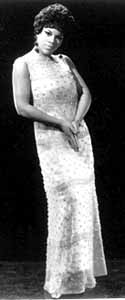 because, in her words, "I liked the way it sounded." At first, neither the new name nor the trio status made any difference. Within the next two years the Supremes released six records, all of which were failures. The group was jokingly referred to around Motown as the "no hit Supremes." But the jokes soon stopped. In June 1964, the Supremes released "Where Did Our Love Go." Within three weeks the song had climbed to the top of the national record charts. It began a string of five consecutive number one hits in a one-year period which included "Come See About Me," "Stop! In the Name of Love," and "Back in My Arms Again." The Supremes had struck gold. They advanced from the bottom of the roster to become the most important act at Motown. Between 1964 and 1967, the group had ten number one records on the national music charts. Their eighteen albums released during this period were also top sellers. They were the number one American recording group. In addition to appearing on every major national television variety show and playing to sold out audiences at the choicest concert venues throughout the world, the Supremes performed commercials for Coca-Cola, public service organizations, Arid Deodorant, and even had a loaf of bread named after them.
What made the group succeed was a combination of chemistry, image, and musical style.
because, in her words, "I liked the way it sounded." At first, neither the new name nor the trio status made any difference. Within the next two years the Supremes released six records, all of which were failures. The group was jokingly referred to around Motown as the "no hit Supremes." But the jokes soon stopped. In June 1964, the Supremes released "Where Did Our Love Go." Within three weeks the song had climbed to the top of the national record charts. It began a string of five consecutive number one hits in a one-year period which included "Come See About Me," "Stop! In the Name of Love," and "Back in My Arms Again." The Supremes had struck gold. They advanced from the bottom of the roster to become the most important act at Motown. Between 1964 and 1967, the group had ten number one records on the national music charts. Their eighteen albums released during this period were also top sellers. They were the number one American recording group. In addition to appearing on every major national television variety show and playing to sold out audiences at the choicest concert venues throughout the world, the Supremes performed commercials for Coca-Cola, public service organizations, Arid Deodorant, and even had a loaf of bread named after them.
What made the group succeed was a combination of chemistry, image, and musical style.
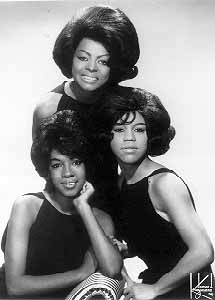 Around mid-1969, her career came to a standstill. Much of her time and energy were taken up with several lawsuits which she had initiated. Also, her growing family added a new responsibility to her life. A third daughter, Lisa, was born in 1972. Though her life was busier and more complicated than ever, Florence was not deterred from setting her career back in order. The media kept a watchful eye on her life and gave periodic reports.
Around mid-1969, her career came to a standstill. Much of her time and energy were taken up with several lawsuits which she had initiated. Also, her growing family added a new responsibility to her life. A third daughter, Lisa, was born in 1972. Though her life was busier and more complicated than ever, Florence was not deterred from setting her career back in order. The media kept a watchful eye on her life and gave periodic reports.